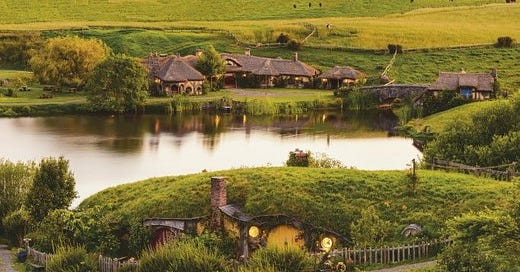We’re presented with a false dichotomy in regard to how we steward the Earth.
Either we must accept the thunderous pillaging and destruction of the forests by greedy right-wing corporate pigs, or we must get rid of all gasoline-powered vehicles, eat soybean “meat”, and be mandated to walk or bike within our utopian “15-minute” city.
Both of these extremes are a symptom of the media polarization that plagues and divides us. While there is no doubt these are representative opinions of some (just look at recent “Just Stop Oil” protests in the UK), most people are capable of holding two seemingly contradictory viewpoints in their hands.
In regards to environmental stewardship, Conservatives in the West have been painted into a corner. This is their own fault. The Right inherently desires to conserve. In general, they are skeptical of sweeping change, conscious of economic consequences, and supportive of scientific and business innovation over mandated government policy to solve problems.
But they are terrible at marketing their vision.
There is nothing sexy about modern conservative environmental policy. And their lack of clear articulation leaves them vulnerable to being tarred and feathered by the extreme wings of left-wing utopian opposition.
But one Conservative thinker, the late Roger Scruton, had a romantic, practical, and community-based framework for environmental sustainability. One that can inspire us. There are no sweeping agendas imposed by bureaucrats in halls of power, there is only local stewardship; a cultural return to the traditions, humility, and closeness with the natural world that characterized our pre-industrial revolution communities.
He called it “Oikophilia” (derived from the Greek words "oikos" for home, and "philia" for love or affection), a love of home; the longing for familiar surroundings, and a sense of responsibility for the environment and the communities in which we live.
Scruton introduced this term in contrast to "oikophobia," which he defined as the fear or hatred of home, or the desire to reject one's cultural heritage. Rather than fear and regulation, Scruton’s idea centers environmental stewardship around our individual responsibilities to the community we call home.
These are the seven primary components of Scruton's idea:
Love and Care for the Local Environment:
At the heart of oikophilia is a profound love and respect for the local environment in which one lives. For Scruton, this love is what motivates people to take care of their surroundings, making environmental conservation a personal and moral issue, not just a political or regulatory one. While there are steps one can take in an urban environment, at its heart, Scruton saw the rural, bucolic community, as an ideal for promoting sustainable stewardship and connection with the Earth.
Stewardship and Responsibility:
Scruton's notion of oikophilia encompasses a sense of duty. This involves cultivating a deep sense of responsibility for preserving and maintaining the local environment and community, not only for the well-being of those present but also for the well-being of future generations. If we love a place, we must care for it as we care for our immediate families. This means cultivating a deep understanding of the intricacies related to the environment and climate in which we live and working within this knowledge to maintain it.
Attachment to Place and Tradition:
Oikophilia involves a deep attachment to one’s home and community and to the traditions and way of life associated with that place. Scruton argued that this attachment is essential for meaningful conservation efforts; people are more likely to care for places that have significance to them. If we don’t have a deep cultural attachment to a place, the likelihood that we will invest our time and energy to preserve it decreases.
Resistance to Radical Change:
Scruton is skeptical of radical changes, especially those that threaten the integrity of beloved places and ways of life. This includes skepticism towards certain large-scale, top-down environmental initiatives that don’t take local realities into account. This also means opposing the pillaging and destruction of small communities for the extraction of resources. These policies, as Scruton argued, are more likely to divide and disrupt, rather than nurture respectful stewardship.
Community and Cooperation:
For Scruton, oikophilia is intrinsically connected to the community. The love of home extends to the people who share that home, creating a sense of solidarity and mutual care. This is tied to the idea that environmental issues are best addressed through community action and cooperation rather than solely through government intervention. Communities who gather together can share concerns and ideas, and work to create effective local solutions and governance to solve environmental problems.
Beauty and Aesthetics:
Scruton believed that our love for our environment is closely tied to our appreciation for its beauty. He argued that people are more likely to care for an environment that they find aesthetically pleasing and that fostering a sense of the beauty of nature is a key part of environmental stewardship.
Sustainability as a Moral Virtue:
In Scruton’s view, living sustainably is not just a practical necessity but a moral virtue. Oikophilia, in this sense, means living in a way that shows respect for the environment as a home that one cherishes and wishes to pass on to the next generation intact and thriving.
Critique of Consumerism:
Scruton argued that oikophilia is in many ways the antithesis of consumerism. While consumerism encourages constant novelty and disposability, oikophilia encourages preservation, care, and sustainable use of resources. When we upcycle, refurbish, and buy locally, we contribute to the local economy and help to create a culture rooted in sustainability and necessity, rather than the addictive thrill of new material items.
Scruton aimed to show that effective environmentalism can be motivated by positive affection and duty towards one’s own surroundings, rather than solely by abstract principles or distant global concerns.
If you cherish your home, your community, and your environment, work to preserve it.
"We must take care of the natural world, and show a forceful sense of responsibility in doing so, not because the natural world has rights, but because we have duties."
Roger Scruton
P.S…
I’ll be releasing more posts/essays/thoughts during the weekday that will be behind a $ 5-a-month paywall.
These weekday posts will have a more personal and actionable framework. My aim is to discuss what I’m currently reading, my work as a creative, and what I find compelling in this great and beautiful mystery called life.
My goal with these posts is to give you tools, thoughts, and ideas from other thinkers, artists, and writers whose ideas and philosophies can help us all live a more creative and meaningful life.
If this interests you please subscribe below.
With love,
-Joe















